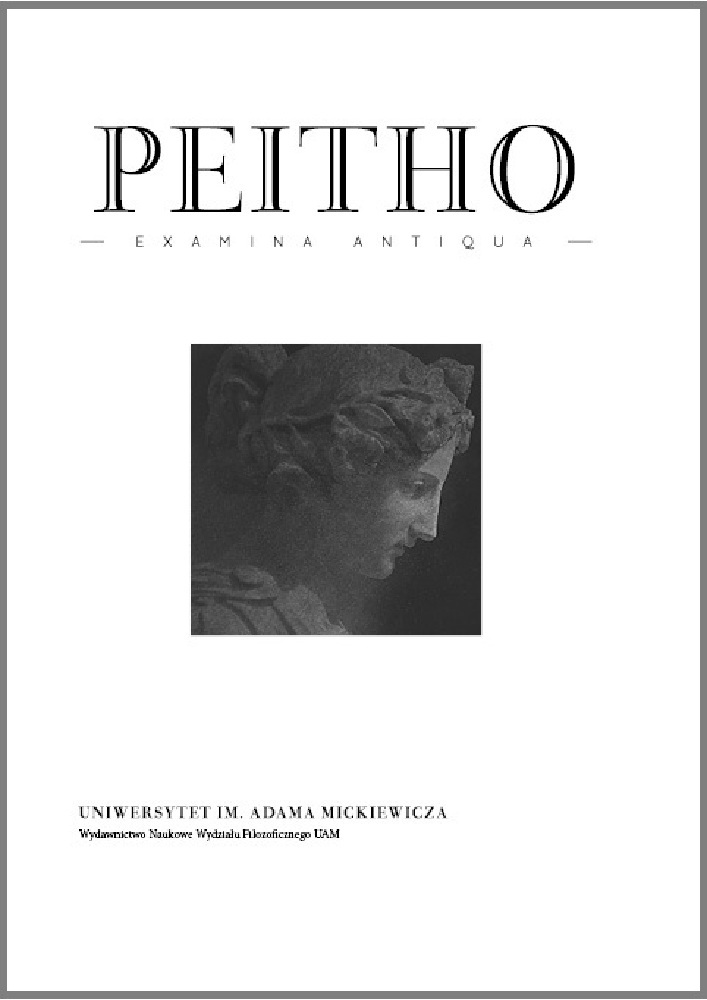Abstract
The article deals with several issues related to the concept of happiness that emerge from Plato’s triptych: the Gorgias, the Republic and the Laws. The focus is on (1) the question of the alleged overcoming of the eudaimonistic imperative, i.e., natural human pursuit of happiness, in the didactic message of the Republic; (2) the question of to what extent the path of cognition ending in the contemplation of the perfect being is at the same time a strive for the supreme happiness; (3) the dilemma of choosing between a reductive and a cumulative model of complete satisfaction in human life; and finally (4) the problem of affiliative conditions of full life satisfaction.
References
Altman, W. H. F., 2018, Ascent to the Good. The Reading Order of Plato’s Dialogues from Symposium to Republic, Lanham.
Annas, J., 1981, An Introduction to Plato’s Republic, Oxford.
Arruzza, C., 2011, „The Private and the Common in Plato’s Republic”, History of Political Thought 32, s. 215–233.
Brown, L., 1998, „How Totalitarian is Plato’s Republic?”, w: E. N. Ostenfeld (ed.), Essays on Plato’s Republic, Aarhus, s. 13–27.
Danek, Z., 2020, Prawdziwe początki filozofii, Łódź.
Goodell, T. D., 1921, „Plato’s Hedonism”, The American Journal of Philology 42, s. 25–39. https://doi.org/10.2307/289396 DOI: https://doi.org/10.2307/289396
Halfwassen, J., 2015, Auf den Spuren des Einen: Studien zur Metaphysik und ihrer Geschichte, Tübingen.
Hansen, M. H., 2010, „Democratic Freedom and the Concept of Freedom in Plato and Aristotle”, Greek, Roman, and Byzantine Studies 50, s. 1–27.
Hittinger, J., 2013, „Plato and Aristotle on the Family and the Polis”, The Saint Anselm Journal 8, s. 1–22.
Kahn, C. H., 2018, Platon i dialog sokratyczny. Wykorzystanie literackiej formy na użytek filozofii, tłum. M. Filip¬czuk, Warszawa.
Kamtekar, R., 2001, „Social Justice and Happiness in the Republic: Plato’s Two Principles”, History of Political Thought 22, s. 189–220.
Katamay, R., 2006, „Platoński dialog jako sposób filozofowania”, Folia Philosophica 24, s. 67–88.
Loizides, A., 2013, John Stuart Mill’s Platonic Heritage: Happiness through Character, Lanham.
Männlein-Robert, I., 2012, „Die Musenkunst des Philosophen oder Sokrates und die Zikaden in Platons Phaidros“, w: D. Koch (hrsg.),
Platon und die Mousiké, Tübingen, s. 83–103.
Matuszak, M., 2009, „Sokrates jako jedyny prawdziwy polityk i polityki nauczyciel – Platon, Gorgiasz 521d5– 7”, w: A. Pacewicz (red.),
Kolokwia Platońskie – Gorgiasz, Wrocław, s. 93–104.
Morrison, D., 2001, „The Happiness of the City and the Happiness of the Individual in Plato’s Republic”, Ancient Philosophy 21, s. 1–24. https://doi.org/10.5840/ancientphil20012116 DOI: https://doi.org/10.5840/ancientphil20012116
Murgier, C., 2014, „Les plaisirs intellectuels dans le modèle platonicien du plaisir», Les Études philoso¬phiques 109, s. 167–186. https://doi.org/10.3917/leph.142.0167 DOI: https://doi.org/10.3917/leph.142.0167
Pacewicz, A., 2016, Hedone. Koncepcja przyjemności w filozofii Platona, Wrocław.
Piechowiak, M., 2009, „Sokrates sam ze sobą rozmawia o sprawiedliwości”, w: A. Pacewicz, Kolokwia Platoń¬skie – Gorgiasz, Wrocław, s. 71–92.
Popper, K., 1962, The Open Society and its Enemies, vol. 1, Princeton.
Russell, D., 2005, Plato on Pleasure and the Good Life, Oxford. https://doi.org/10.1093/0199282846.001.0001 DOI: https://doi.org/10.1093/0199282846.001.0001
Stone, M., 2018, „Plato, Environmental Sustainability, and Social Justice”, Athens Journal of Humanities & Arts 5, s. 105–118. https://doi.org/10.30958/ajha.5.1.6 DOI: https://doi.org/10.30958/ajha.5.1.6
Szlezák, T. A., 2003, „Idea Dobra jako „arche” w „Politei” Platona”, tłum. E. I. Zieliński, M. Osmański, Roczniki Filozoficzne 51, s. 403–425.
Tigerstedt, E. N., 1977, Interpreting Plato, Uppsala.
Vlastos, G., 1977, „The Theory of Social Justice in the Polis in Plato’s Republic”, w: H. F. North (ed.), Interpre¬tations of Plato, Leuven, s. 1–40. https://doi.org/10.1163/9789004327672_002 DOI: https://doi.org/10.1163/9789004327672_002
Williams, B., 1973, „The Analogy of City and Soul in Plato’s Republic”, w: E. N., Lee et al. (eds.), Exegesis and Argument, Assen, s. 196–206.
Yacobi, B. G., 2015, „Life and the Pursuit of Happiness”, Journal of Philosophy of Life 5, s. 82–90.
License
Copyright (c) 2022 Zbigniew Danek

This work is licensed under a Creative Commons Attribution 4.0 International License.
Peitho provides immediate open access to its content on the principle that making research freely available to the public supports a greater global exchange of knowledge.

